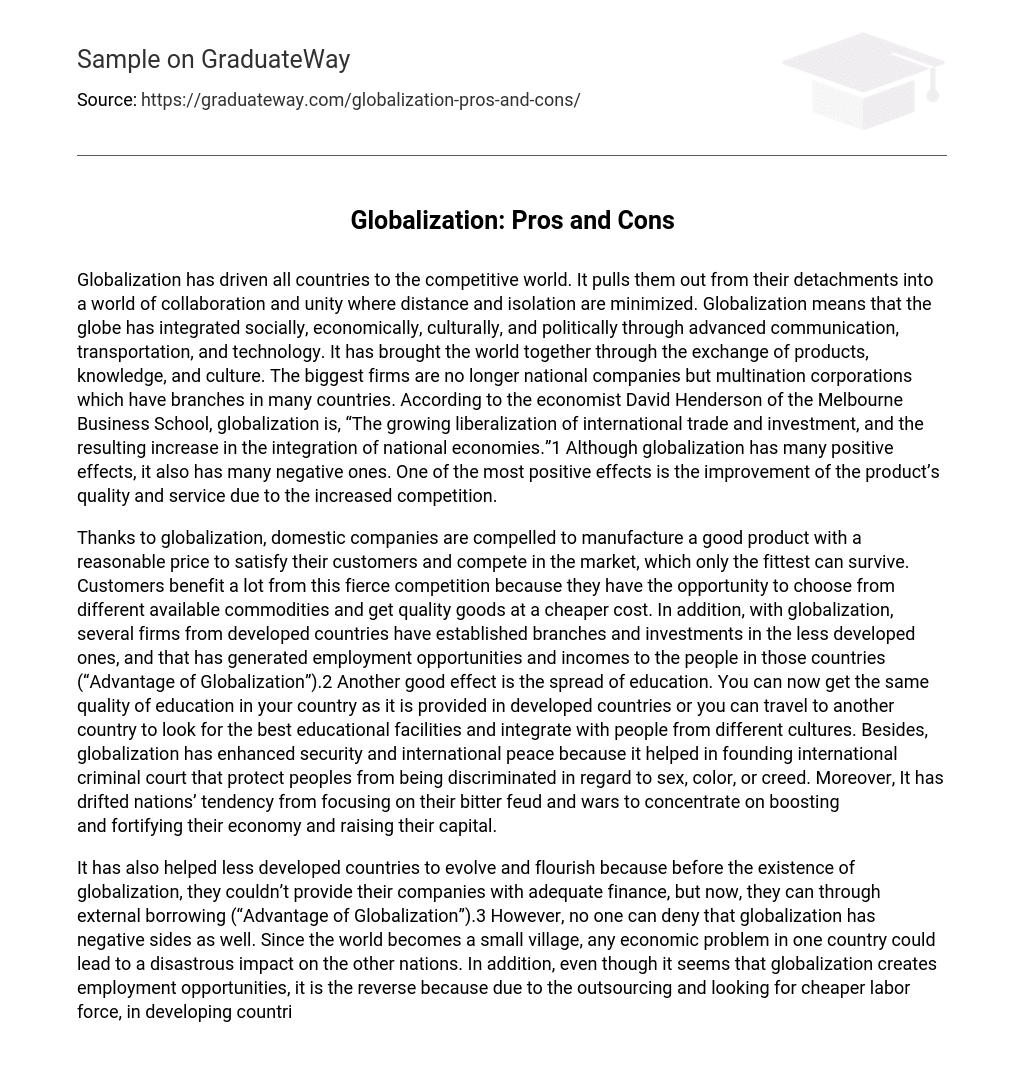Globalization has driven all countries to the competitive world. It pulls them out from their detachments into a world of collaboration and unity where distance and isolation are minimized. Globalization means that the globe has integrated socially, economically, culturally, and politically through advanced communication, transportation, and technology. It has brought the world together through the exchange of products, knowledge, and culture. The biggest firms are no longer national companies but multination corporations which have branches in many countries. According to the economist David Henderson of the Melbourne Business School, globalization is, “The growing liberalization of international trade and investment, and the resulting increase in the integration of national economies.”1 Although globalization has many positive effects, it also has many negative ones. One of the most positive effects is the improvement of the product’s quality and service due to the increased competition.
Thanks to globalization, domestic companies are compelled to manufacture a good product with a reasonable price to satisfy their customers and compete in the market, which only the fittest can survive. Customers benefit a lot from this fierce competition because they have the opportunity to choose from different available commodities and get quality goods at a cheaper cost. In addition, with globalization, several firms from developed countries have established branches and investments in the less developed ones, and that has generated employment opportunities and incomes to the people in those countries (“Advantage of Globalization”).2 Another good effect is the spread of education. You can now get the same quality of education in your country as it is provided in developed countries or you can travel to another country to look for the best educational facilities and integrate with people from different cultures. Besides, globalization has enhanced security and international peace because it helped in founding international criminal court that protect peoples from being discriminated in regard to sex, color, or creed. Moreover, It has drifted nations’ tendency from focusing on their bitter feud and wars to concentrate on boosting and fortifying their economy and raising their capital.
It has also helped less developed countries to evolve and flourish because before the existence of globalization, they couldn’t provide their companies with adequate finance, but now, they can through external borrowing (“Advantage of Globalization”).3 However, no one can deny that globalization has negative sides as well. Since the world becomes a small village, any economic problem in one country could lead to a disastrous impact on the other nations. In addition, even though it seems that globalization creates employment opportunities, it is the reverse because due to the outsourcing and looking for cheaper labor force, in developing countries, many people in Europe and US have lost their jobs. It has also affected culture, for peoples now almost look the same; they eat the same food, listen to the same music, and wear the same clothes. One can barely distinguish between their nationalities. Furthermore, it has escalated the situation of the environment through draining chemical wastes in the oceans, discharging greenhouse gases, and over depleting land resources (“Disadvantage of Globalization”).4 To sum up, Globalization comes with positive and negative sides.
However, its benefits far outweigh its drawbacks. For example, people who used to live in famine and fear of diseases in Africa can now have access to medicine, food, and clean water through transportation in no time, so thanks to globalization, life expectancy in Africa has increased greatly. Even though it has harmed the environment, we should look to the bright side. The world now is united and more coherent than ever. Countries now can cooperate and use their knowledge and science to tackle the ecology issue and make the world a better place for living.





